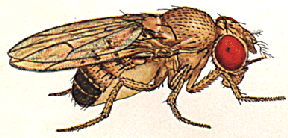Awake at Night
Mutant fruit flies can get by with less sleep than these insects normally need.
By Emily Sohn
The less sleep I get, the unhappier I become. When I’m really tired, I have trouble concentrating. I can’t get any work done. I get cranky and irritable, and everything starts to annoy me.
I know lots of people just like me, but I also have friends who can stay up all night and still seem chipper the next day. How well do you fare after a slumber-less sleepover?
The answer, it turns out, may depend on biology. A study with fruit flies has revealed a single gene that makes a drastic difference in how much sleep the insects need.
 |
|
A fruit fly.
|
Scientists have been studying sleep for decades, but they still know very little about the genes involved. Genes are stretches of DNA found within every cell. They direct all sorts of processes in the body.
Sleep researchers from the University of Wisconsin–Madison decided to focus on certain fruit flies (called Drosophila melanogaster) because their genes are easy to study and similar to ours. Fruit flies also sleep a lot, typically 9 to 15 hours a day. A sleeping fly looks like it’s just sitting still. You can’t hear the snores.
The researchers collected more than 9,000 groups of fruit flies. Each group had a different set of genes. The scientists then observed several flies of each type to see how many hours a day the insects slept and how they behaved after being kept awake for 24 hours.
One group of flies proved to be the most interesting. Named minisleep flies, they slept only 4 to 5 hours a day. Even after 24 hours without sleep, they did just as well on reaction tests as rested flies did. Normal sleep-deprived flies were much slower to react.
After a series of tests, the scientists discovered one mutation in a single gene in the minisleep flies. As a result, these flies have nerves that appear to get excited easily. It’s possible that people who don’t need much sleep have a similar mutation.
In every other way, minisleep flies seemed normal—except one. Most fruit flies live for about 3 or 4 months. The minisleepers lived about 2 weeks less. So, even if you feel fine on little sleep, the researchers say, skimping on sleep might affect your health in other ways.
Knowing that, I’m going to make sure to sleep in tomorrow. If nothing else, I’ll be a lot more pleasant to be around.—E. Sohn
Going Deeper:
Brownlee, Christen. 2005. Losing sleep: Mutant flies need less shut-eye. Science News 167(April 30):275-276. Available at http://www.sciencenews.org/articles/20050430/fob2.asp .
2005. Wisconsin researchers identify sleep gene. University of Wisconsin press release. April 27. Available at www.news.wisc.edu/11131.html.
Hesman, Tina. 2000. Fly naps inspire dreams of sleep genetics. Science News 157(Feb. 19):117. Available at http://www.sciencenews.org/articles/20000219/fob4.asp .
Sohn, Emily. 2003. Sleeping soundly for a longer life. Science News for Kids (Feb. 12). Available at http://www.sciencenewsforkids.org/articles/20030212/Note2.asp .
To learn more about Drosophila genes and their role in development, see www.sdbonline.org/fly/aimain/1aahome.htm (Society for Developmental Biology).







